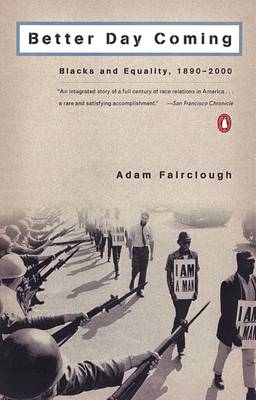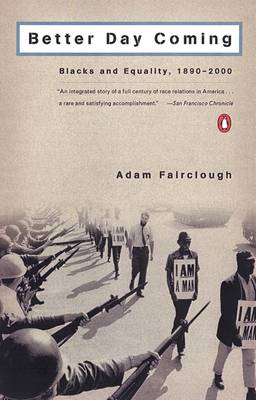
- Afhalen na 1 uur in een winkel met voorraad
- Gratis thuislevering in België vanaf € 30
- Ruim aanbod met 7 miljoen producten
- Afhalen na 1 uur in een winkel met voorraad
- Gratis thuislevering in België vanaf € 30
- Ruim aanbod met 7 miljoen producten
Zoeken
€ 44,45
+ 88 punten
Omschrijving
From the end of postwar Reconstruction in the South to an analysis of the rise and fall of Black Power, acclaimed historian Adam Fairclough presents a straightforward synthesis of the century-long struggle of black Americans to achieve civil rights and equality in the United States. Beginning with Ida B. Wells and the campaign against lynching in the 1890s, Fairclough chronicles the tradition of protest that led to the formation of the NAACP, Booker T. Washington and the strategy of accommodation, Marcus Garvey and the push for black nationalism, through to Martin Luther King, Jr., and the Civil Rights Movement of the 1960s and beyond. Throughout, Fairclough presents a judicious interpretation of historical events that balances the achievements of the Civil Rights Movement against the persistence of racial and economic inequalities.
Specificaties
Betrokkenen
- Auteur(s):
- Uitgeverij:
Inhoud
- Aantal bladzijden:
- 400
- Taal:
- Engels
Eigenschappen
- Productcode (EAN):
- 9780142001295
- Verschijningsdatum:
- 25/06/2002
- Uitvoering:
- Paperback
- Formaat:
- Trade paperback (VS)
- Afmetingen:
- 127 mm x 230 mm
- Gewicht:
- 381 g

Alleen bij Standaard Boekhandel
+ 88 punten op je klantenkaart van Standaard Boekhandel
Beoordelingen
We publiceren alleen reviews die voldoen aan de voorwaarden voor reviews. Bekijk onze voorwaarden voor reviews.











